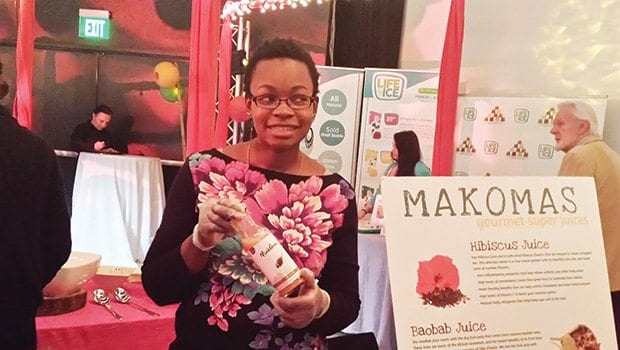Entrepreneur bottles family recipes
Makomas draws on founder’s Ivory Coast heritage, makes headway with local retailers

Magbè Savané came to the United States from the Ivory Coast with dreams of being a doctor, but life intervened — she got married and felt the urge to start a family, so she did. However, her desire to pursue a career remained and she turned to a family juice-making tradition to start her own business.
Founded late last year, her company Makomas makes three traditional juice drinks that harken back to Savané’s youth in Africa: Ginger Drink, Baobab Drink and Hibiscus Tea. Her mother sold similar beverages in small plastic bags to neighbors and town folk. As a child Savané helped her mother hand-make the drinks using all-natural and simple ingredients. The 30-year-old recalls these days fondly and said juice-making immediately popped to mind when she was considering starting her own business.
Despite being an ocean away, Savané is insistent on replicating the simple, traditional juice products she made with her mother back home. Makomas’ drinks use organic West African fruits, flowers and roots. They are crafted in small batches by Savané herself, and you won’t be puzzled by any of the ingredients on the list.
Each drink has three ingredients or fewer, in addition to water. Ginger Drink, for example, is water, organic ginger, organic cane sugar and organic lemon. Hibiscus Tea has even less in it, just water, organic hibiscus tea and organic cane sugar.
In the U.S, as the clamor for organic and natural products continues to rise, Makomas has already struck a nerve with its simplicity. Savané may just be following the old family recipe for her drinks — and not trying to capitalize on a consumer trend by going organic — but she will certainly take the benefits.
Namely, in January of this year, after just a few months of making juice, she was able to get products into Whole Foods Market stores around Boston. She is in over half a dozen Whole Foods and working to get in more.
The store is a perfect fit for her juices.
“They like the product. They like the story behind it. And they wanted the product in their store,” Savané said.
She has also hit the streets to get the product in other independent stores such as Cambridge Naturals in Cambridge, Mennab Gift Shop in Roxbury, Living Earth in Worcester and even as far away as River Valley Market in Northampton.
An educated start
A 2010 graduate of Colby Sawyer College, Savané focused her education on the sciences to prepare for medical school. When she began to think about starting a business she took advantage of programs in the Boston area that help entrepreneurs. In particular, she said she benefited from taking some classes at the Center for Women & Enterprise to help hone her business skills.
Because she runs a one-woman operation, Savané’s business training has been very helpful, offering critical insight into sales, marketing and back-end-operations.
The juice production education was provided by her mother, but Savané runs Makomas out of her Revere home and she travels to a production facility in Greenfield to make batches of her juices and bottle them. Savané rents out facility space and pays some temp workers to help her put together the product.
Right now, she makes the trip every other month and produces a batch of about 400 bottles of each juice. It takes her about a day to make a batch for each of the three different juices.
As the business grows, Savané expects to have to make more trips to the production facility, but she said she can expand there and even has a backup facility lined up if she needs it.
She brings the bottled products back to her home office and packs them for orders herself, but this is also something that can be ramped up, if needed, by hiring a shipping manager to handle more product.
Makomas also sells its juices online through the company website.
A personal passion
While the potential for the business seems great, Savané seems to revel in her ability to be involved in something she has a passion for and also be around her family. The name Makomas, often mistakenly thought of as African, is actually just a combination of her name, her husband’s name, Kolo, and her son’s name, Malick.
She also likes offering a taste of the Ivory Coast here.
“The United States is supposed to be a melting pot and I wanted to be part of it, to bring something from my home country,” Savané said. “I thought, why not bring something exotic and delicious to the customer?”
This is also the reason why, though Makomas has three juice flavors — ginger, baobab and hibiscus — baobab is the drink Savané is the most passionate about.
The drink is made from the fruit of the African baobab tree, which are iconic on the African savannah. The baobab fruit is about the size of a coconut with a velvety shell and a powdery white interior. To make it into a drink, the dry fruit pulp is mixed with water and natural sweeteners. It is part of the “superfruit” category with many claimed health benefits and six-times more vitamin C than oranges, six-times more antioxidants than blueberries, six-times more potassium than bananas and two-times more calcium than a glass of milk. The Makomas Baobab Drink has a sweet and tangy sherbet-like flavor.
Savané admits that you have to win people over to trying the baobab flavor, but the reaction is usually great.
“Once they try it they really, really like it,” she said. “It is not like anything you are expecting.”
Winning over the customers is really the main hurdle Savané sees in growing her business. Though she has found success convincing stores to stock her drink, if people don’t buy it Makomas will be yanked from the shelves quick.
“Refrigerator space is really tight at most stores and it is really hard to get space,” she said. “Now, I have to fight to keep the space.”
The immediate future of the business is very much tied to Whole Foods. The hope is to expand at the store chain throughout New England. If Makomas can get regional status with Whole Foods it would open the door to national locations, which could be a massive boost for sales and distribution.
But Savané knows it all comes back to customers liking the drink.
“My goal right now is to be able to get people addicted to my product and to be in more stores and do more marketing so people know I exist,” she said.






